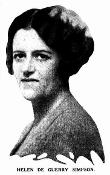Helen Simpson's father was a Sydney solicitor and her mother was the daughter of a French Marquis. At thirteen she was sent as a boarder to the Convent of the Sacred Heart, Rose Bay, Sydney, and she completed her high school education at Abbotsleigh in 1912. Her parents separated during this time and her mother moved to London. Simpson joined her mother in 1914 and entered Oxford the following year to study French. In 1918 she joined the Women's Royal Naval Service as a decoder, but she returned to Oxford in 1919 to study music, hoping to become a composer. Here Simpson developed an interest in drama, writing several plays and founding the Oxford Women's Dramatic Society. But she failed to complete her degree after strict regulations were broken when male and female students were allowed to perform together.
Simpson returned to Sydney in 1921 for her brother's wedding. While in Australia she published a collection of verse and wrote a play that was staged in 1923. Back in Oxford the next year she declared to friends that most modern novels were 'written in six weeks by half-wits or persons under the influence of drink'. Responding to a challenge, she completed her first novel, Acquittal, in five weeks. Three more books followed in as many years, each reflecting Simpson's interests in detective fiction and demonology.
Simpson married the paediatric surgeon Denis Browne (a nephew of 'Rolf Boldrewood') in 1927 and their daughter Clemence was born the following year. Motherhood did not slow her down. She had completed five more novels by 1931, including several with Clemence Dane that were adapted for the cinema under the direction of Alfred Hitchcock. In 1932 she won the prestigious James Tate Black memorial prize for Boomerang, her first novel to deal with Australia. Previous winners of this prize included D. H. Lawrence, E. M. Forster and Arnold Bennett. Another novel, Under Capricorn (1937), was set in colonial New South Wales. It was adapted for the cinema in 1949 (again with Hitchcock as director) and retained its interest for many years, screening as a British/Australian mini-series in the 1980s.
In the late 1930s Simpson delivered many lectures on historical and literary topics. Her friends included Dorothy Sayers and John Masefield and she was a member of several literary societies. Her profile and popularity saw her endorsed as a liberal candidate for the Isle of Wight in 1938. But suffering from cancer, she died at Overbury in Worcestershire at the age of forty-two, leaving an epic Australian novel unfinished.
 5475067764492880859.jpg
5475067764492880859.jpg